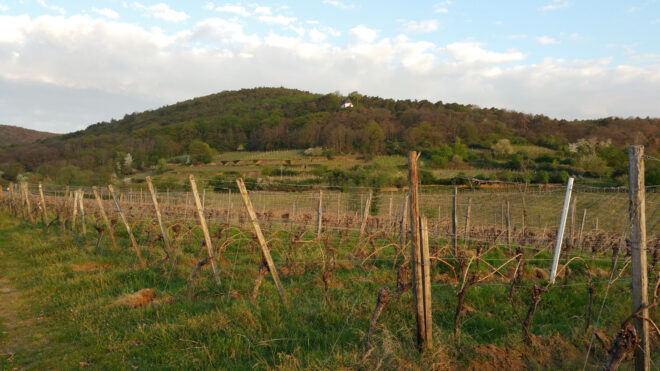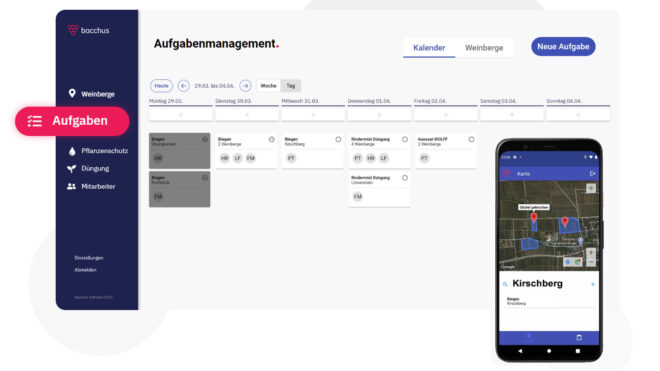The champagne is already chilled and waiting. And it won’t be long before Philipp Bletzer, Maximilian Dick and Julian Herrlich can raise a glass in toast to making their first customer’s life as a winemaker easier. And sooner or later, the three of them will even enjoy a drop of the cold stuff that they have helped to cultivate. Admittedly, their contribution will be more indirect than it had been in their younger years, when they worked in their homeland’s vineyards. But it will be an equally important contribution nonetheless. The three students have developed software that lightens winegrowers’ workload: Bacchus. The software promises to provide a quick overview of the complex processes involved in making good wine.
Currently, grape growers are still having to juggle copious amounts of pens, paper and lever arch files to manage their admin.
Philipp Bletzer
“Currently, grape growers are still having to juggle copious amounts of pens, paper and lever arch files to manage their admin,” explains Mr Bletzer. “This is where digitalisation can offer a number of advantages. For example, the data can be accessed, anytime and anywhere.” He came up with the idea for the software in a course on “Entrepreneurship” at the University of Mannheim in Germany, where he studies Business Informatics.
But his interest in winemaking goes back much further: To the grapevines of Bad Dürkheim along the German wine route, the Weinstraße. “My grandfather is a winemaker, so I saw a lot of the day-to-day work that goes into grape growing from an early age,” says Mr Bletzer. It is this childhood affinity to vineyards that he shares with his colleagues. Mr Dick also grew up in the Palatinate region, while Mr Herrlich comes from the vineyards of Saxony, where, just like in the South West, wine has been grown for centuries.

With their app, the young men want to save winemakers time and nerves – and enable them to concentrate on the essentials.
Collaborating with winegrowers to develop ‘fruitful’ software
For the three 25-year-olds, the fact that the grape growing trade is one characterised by tradition does not negatively impact their software’s chances of success. “There’s a generational change happening in many wineries, and younger winemakers are starting to see the benefits of digitalisation,” says Mr Bletzer.
To develop Bacchus, the three budding software developers worked with wineries big and small and of distinct growing philosophies, finding out about the difficulties they face as well as their needs. The result: A ‘fruitful’ software that allows vineyard processes to be co-ordinated via an intuitive user interface. Mr Dick explains: “If, for example, part of a wire fence in a vineyard is broken, growers can track it by setting GPS markers in the app. Wine makers often keep a record of damage like this by colour-marking corner posts – they then have to drive all the way back across the vineyard or explain to the staff where the spot is so they can mark it for them. With our software, there is no loss of information.”

The interface of the software: The programme should function simply and intuitively.
Going paperless
Pivotal in preventing this loss of information is vineyard geodata from the land registry office, which winegrowers can import into the app “with just a few clicks,” Mr Bletzer says. Above all, it is important to the three digitisers that the Bacchus software works simply and intuitively. Mr Herrlich sees the software benefiting future users by saving them both time and effort: “A winemaker with 60 individual vineyards spread generously around the region has to co-ordinate all the separate jobs that need doing: Who does what, when and where?”
To name just one example, Bacchus enables precise and paperless documenting of the pesticides winemakers use, something which they are obliged to do. The same applies to fertilisers. All employees who have the app installed on their devices can see exactly where records need updating.
We continue to develop the software in collaboration with our customers so that it meets winemakers’ needs.
Philipp Bletzer
Currently, Messrs Bletzer, Dick and Herrlich are also considering the possibility of Bacchus versions in other languages. “We continue to develop the software in collaboration with our customers so that it meets winemakers’ needs,” says Mr Bletzer. Long term, he and his colleagues would like to develop an operating system which can be used to oversee and control all vineyard processes. Short term, however, there is only one thing on their minds: Popping open a bottle of champagne.
